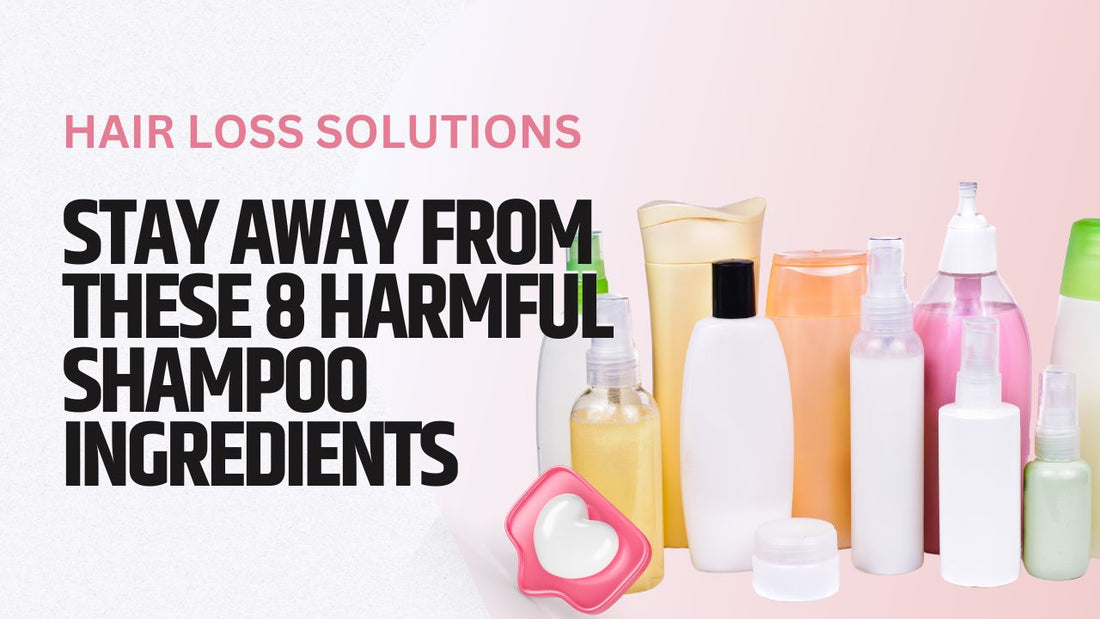
The Dirty Truth About Hair Care: Stay Away from These 8 Harmful Shampoo Ingredients
Share
In the pursuit of luxurious and healthy hair, our daily routines often include the use of various hair care products, with shampoo being a cornerstone. However, unbeknownst to many, the innocent-looking bottle of shampoo on your shower shelf might harbor a range of harmful ingredients that can affect both the health of your hair and your overall well-being. This article serves as an eye-opening guide to eight such shampoo ingredients that you should be wary of. By steering clear of these ingredients, you can ensure not only the vitality of your hair but also your personal health.
Harmful Ingredients Lurking in Your Shampoo
Unveiling the Culprits
Before we delve into the specifics, it's essential to acknowledge the complexity of the personal care product industry. The labels on these products often require a discerning eye and an understanding of the ingredient list. Being informed about the potential dangers of certain ingredients gives you the power to make more conscious choices for your hair care routine.

Sodium Lauryl Sulfate (SLS) and Sodium Laureth Sulfate (SLES)
Sulfates are common in shampoos because they create foam. But they can strip your scalp and hair of natural oils, causing dryness, irritation, and worsening skin conditions. Sulfates may also be linked to health problems, so look for sulfate-free shampoos that clean without harming your scalp.

Parabens
Parabens have gained notoriety as preservatives in a wide range of personal care products, including shampoos. Their purpose is to extend the product's shelf life by preventing the growth of harmful bacteria. However, parabens have been shown to interfere with hormonal balance due to their estrogen-mimicking properties. Studies have indicated a possible connection between parabens and breast cancer, making it prudent to opt for paraben-free shampoos or those that use natural preservatives to ensure both the longevity of your shampoo and your well-being.

Silicones
Silicones are responsible for giving shampoos and conditioners their silky texture and that coveted shiny finish. However, prolonged use of silicone-containing products can have a detrimental effect on your hair's health. The reason lies in silicone's ability to create a barrier on the hair shaft, which can lead to product buildup over time. This buildup not only weighs down your hair but also prevents essential moisture from penetrating the hair shaft. To maintain hair that's vibrant and full of life, it's advisable to switch to silicone-free hair care products that allow your hair to breathe and absorb nutrients effectively.
![]()
Formaldehyde-Releasing Agents
Formaldehyde-releasing agents, though effective at preserving the freshness of shampoos, come with a significant downside. These agents can release formaldehyde, a well-known irritant and allergen, when they come into contact with water. This can lead to skin irritation, itching, and even respiratory issues when you inhale the fumes. Opting for shampoos that use natural preservatives or milder alternatives ensures that your hair care routine remains safe and irritation-free.
Synthetic Fragrances
Many shampoos boast of enticing scents that are often attributed to synthetic fragrances. However, these fragrances can be a hidden source of concern. Manufacturers are not required to disclose the specific chemicals used in these fragrances, which can potentially contain allergens and irritants. For those with sensitive skin, synthetic fragrances can trigger allergic reactions and skin irritation. Switching to fragrance-free shampoos or those scented with natural essential oils is a safer route to maintaining both the health of your hair and your skin.
Phthalates
Phthalates are commonly added to shampoos and other personal care products to enhance the longevity of fragrances. However, these chemicals are known as endocrine disruptors, meaning they can interfere with hormone production and regulation. This disruption can have far-reaching effects, impacting not only your hair health but also your overall well-being. Opting for phthalate-free shampoos ensures that your hair care routine remains in harmony with your body's natural processes.

Formaldehyde
Formaldehyde, a strong preservative and disinfectant, can be found in certain hair straightening treatments. Exposure to formaldehyde poses a range of health risks, including eye and throat irritation, respiratory issues, and even a potential link to cancer. Avoid hair straighteners with formaldehyde to protect health and hair.
DEA, MEA, and TEA
Diethanolamine (DEA), Monoethanolamine (MEA), and Triethanolamine (TEA) are chemicals commonly used to create the foamy lather in shampoos. While these foaming agents contribute to a luxurious washing experience, they can react with other ingredients in the product to form nitrosamines, which are potentially carcinogenic compounds. Opting for sulfate-free shampoos that use alternative foaming agents can help you enjoy that bubbly sensation without compromising on your health.
Adding Rosemary Oil to Your Shampoo
Harnessing the Power of Rosemary Oil
In the midst of the concerns surrounding harmful shampoo ingredients, there are natural remedies that can enhance your hair care routine. One such remedy is the inclusion of rosemary oil in your shampoo. Rosemary oil is known for its beneficial properties that promote hair health.

Benefits of Rosemary Oil
Rosemary oil has been used for centuries to stimulate hair growth and improve overall hair health. It increases blood circulation to the scalp, which nourishes hair follicles and encourages hair growth. Additionally, rosemary oil has antimicrobial properties that can help combat dandruff and scalp irritation.
How to Add Rosemary Oil to Your Shampoo
- Choose a Mild Shampoo: Opt for a sulfate-free and silicone-free shampoo to ensure that the benefits of rosemary oil are not hindered by other harmful ingredients.
- Mixing Ratio: For every 1 ounce of shampoo, add about 10 drops of rosemary oil. This ratio allows you to experience the benefits of the oil without overwhelming your senses.
- Mix Thoroughly: Combine the rosemary oil and shampoo in a small container and mix thoroughly to ensure even distribution.
- Patch Test: Before applying the mixture to your scalp, perform a patch test on a small area of skin to ensure you don't experience any adverse reactions.
- Massage and Rinse: During your regular shampoo routine, gently massage the rosemary oil-infused shampoo into your scalp. Allow it to sit for a few minutes before rinsing thoroughly.
Note of Caution
While rosemary oil can offer numerous benefits, it's important to remember that essential oils are potent and should be used with care. Always perform a patch test before applying any essential oil directly to your scalp, and discontinue use if you experience any irritation.
Choosing Safer Alternatives
Navigating the Hair Care Aisle
In the overwhelming landscape of hair care products, it's important to develop a discerning eye when reading labels. Look for products that transparently list recognizable, natural ingredients. Choosing wisely for your hair also backs your dedication to a healthier lifestyle with informed decisions.
Ingredients to Embrace
As you embark on a journey towards healthier hair care, consider incorporating ingredients that promote hair vitality. Aloe vera, known for its soothing properties, can alleviate scalp irritation. Argan oil is a rich source of antioxidants and essential fatty acids, which nourish and strengthen hair. Tea tree oil offers antimicrobial benefits, making it a valuable addition to combat dandruff and scalp issues. By embracing these natural ingredients, you're enhancing your hair care routine with elements that work in harmony with your body's needs.
Empowering Your Hair Care Choices: A Call to Action
Knowing about these eight harmful shampoo ingredients empowers you to make choices that prioritize not only your hair's appearance but also your overall health. By avoiding these problematic compounds and opting for safer alternatives, you're taking a proactive step toward nurturing both your hair and your well-being. As you embark on this journey, remember that every choice you make in your hair care routine contributes to the holistic health of your body.
FAQs About Hair Care and Shampoo Ingredients
Q1: Are all shampoos with sulfates bad for my hair?
Not necessarily. While sulfates like SLS and SLES can lead to dryness and irritation, sulfate-free options are milder and can still provide effective cleansing without the harsh effects.
Q2: How can I identify shampoos with harmful ingredients?
Scan ingredient lists for names like "sodium lauryl sulfate," "parabens," and "phthalates." Seek out products that proudly declare being sulfate-free, paraben-free, and phthalate-free.
Q3: Can I still enjoy fragrant hair products without synthetic fragrances?
Certainly! Look for shampoos scented with natural essential oils, which offer delightful scents without the potential hidden chemicals of synthetic fragrances.
Q4: Are there any DIY alternatives for hair care?
Absolutely. Many DIY recipes use natural ingredients like apple cider vinegar, coconut oil, and honey for cleansing, conditioning, and promoting hair health.
Q5: How soon can I expect to see positive changes after switching to safer shampoos?
Results can vary, but with consistent use, improvements in scalp health and hair appearance can become noticeable within several weeks to a couple of months.
Conclusion
Armed with insights into these eight detrimental shampoo ingredients, you have the tools to make choices that resonate with both your hair's well-being and your broader health goals. By bypassing these questionable compounds and opting for safer options, you're making a resounding statement – that you value not only the outward appearance of your hair but also the inner vitality of your body. So, embrace the power of informed decisions, and let your hair radiate health and beauty like never before.


















